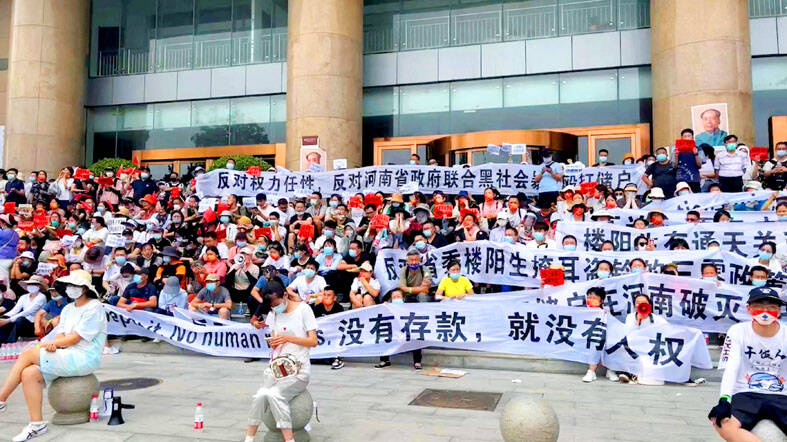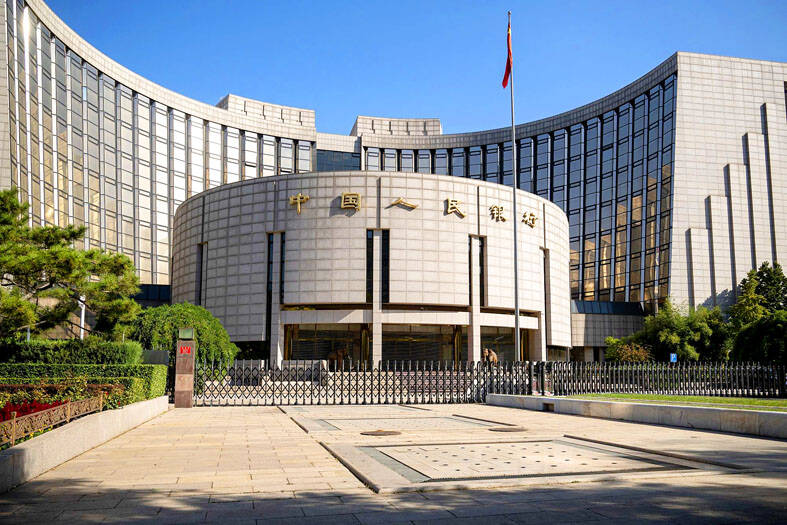China should aim for at least 5 percent GDP growth next year and move urgently to lift the economy from its COVID-19 pandemic slowdown, a Chinese central bank adviser and prominent state-linked economist said.
If China can “largely or completely get rid of the impact of the pandemic in the first half of next year” and implement various policies to stabilize the economy, actual growth could be higher than 5 percent in 2023, Liu Shijin (劉世錦), a member of the monetary policy committee of the People’s Bank of China (PBOC), said in a speech at the Caixin Summit in Beijing yesterday.
“The urgent priority now is to get economic growth back to a normal track and reasonable range,” he said, adding that the current rate of expansion being too low is bad for long-term development goals.

Photo: REUTERS
An extended downturn would damage productivity and the yuan exchange rate, he said, adding that cities that were locked down to curb the spread of COVID-19 suffered long-lasting economic damage.
Favorable conditions are increasing after recent steps were taken to address the impact of “zero COVID-19” policies on the economy and ease a property downturn, Liu said.
The country should aim for an average GDP growth of 5 percent for the next two years, as it is difficult for growth to reach that level this year, Liu said.

Photo: Bloomberg
The government has downplayed its official GDP target of “around 5.5 percent” for this year amid a sharp slowdown in growth, with economists polled by Bloomberg forecasting just 3.3 percent for the year.
To achieve China’s goal of becoming a “medium-developed country” by 2035 and double per-capita GDP, the economy needs to grow at an average speed of 4.7 percent until then, Liu said, adding that it would be difficult.
Another way to achieve the 2035 goal would be to improve overall productivity, he said.
Doing so would lead to the appreciation of the yuan against the US dollar, similar to what happened in Japan and Germany in the two decades following the 1970s, he said.
Several other economists with Chinese government connections also authorities to address downbeat growth at the Caixin conference.
Yang Weimin (楊偉民), a senior economic official at the Chinese People’s Political Consultative Conference, the country’s top political advisory body, called on authorities to “make a strong push” to get growth back on track next year.
“Economic growth this year is not within a reasonable range, and the biggest risk to economic development now is that the growth rate is too low,” Yang said.
Huang Yiping (黃益平), a Peking University professor and a former PBOC adviser, called for more government spending on public welfare next year to support consumption.

Among the rows of vibrators, rubber torsos and leather harnesses at a Chinese sex toys exhibition in Shanghai this weekend, the beginnings of an artificial intelligence (AI)-driven shift in the industry quietly pulsed. China manufactures about 70 percent of the world’s sex toys, most of it the “hardware” on display at the fair — whether that be technicolor tentacled dildos or hyper-realistic personalized silicone dolls. Yet smart toys have been rising in popularity for some time. Many major European and US brands already offer tech-enhanced products that can enable long-distance love, monitor well-being and even bring people one step closer to

Malaysia’s leader yesterday announced plans to build a massive semiconductor design park, aiming to boost the Southeast Asian nation’s role in the global chip industry. A prominent player in the semiconductor industry for decades, Malaysia accounts for an estimated 13 percent of global back-end manufacturing, according to German tech giant Bosch. Now it wants to go beyond production and emerge as a chip design powerhouse too, Malaysian Prime Minister Anwar Ibrahim said. “I am pleased to announce the largest IC (integrated circuit) Design Park in Southeast Asia, that will house world-class anchor tenants and collaborate with global companies such as Arm [Holdings PLC],”

TRANSFORMATION: Taiwan is now home to the largest Google hardware research and development center outside of the US, thanks to the nation’s economic policies President Tsai Ing-wen (蔡英文) yesterday attended an event marking the opening of Google’s second hardware research and development (R&D) office in Taiwan, which was held at New Taipei City’s Banciao District (板橋). This signals Taiwan’s transformation into the world’s largest Google hardware research and development center outside of the US, validating the nation’s economic policy in the past eight years, she said. The “five plus two” innovative industries policy, “six core strategic industries” initiative and infrastructure projects have grown the national industry and established resilient supply chains that withstood the COVID-19 pandemic, Tsai said. Taiwan has improved investment conditions of the domestic economy

Sales in the retail, and food and beverage sectors last month continued to rise, increasing 0.7 percent and 13.6 percent respectively from a year earlier, setting record highs for the month of March, the Ministry of Economic Affairs said yesterday. Sales in the wholesale sector also grew last month by 4.6 annually, mainly due to the business opportunities for emerging applications related to artificial intelligence (AI) and high-performance computing technologies, the ministry said in a report. The ministry forecast that retail, and food and beverage sales this month would retain their growth momentum as the former would benefit from Tomb Sweeping Day